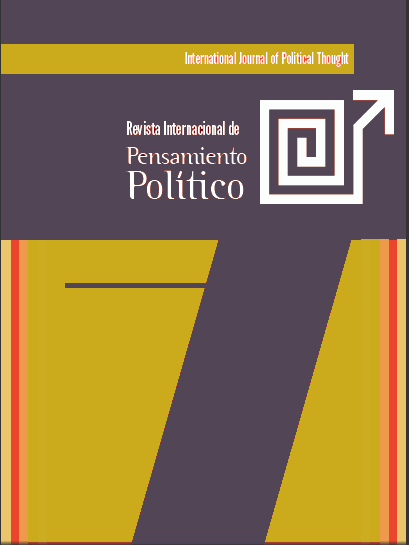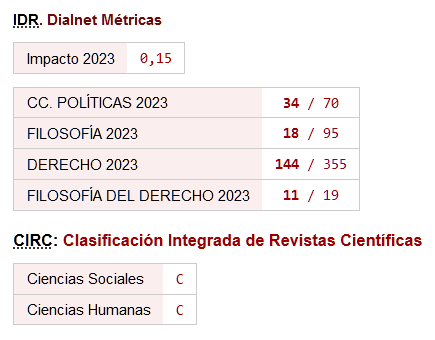Matrimonios de conveniencia, mercados de ciudadanía y resistencia migratoria
DOI:
https://doi.org/10.46661/revintpensampolit.10644Palabras clave:
matrimonio de conveniencia, compraventa de ciudadanía, mercados de ciudadanía, resistencia migratoria, ética de las migracionesResumen
La moralidad de los matrimonios de conveniencia ha sido ampliamente ignorada por la ética de las migraciones. El objetivo de este artículo es subsanar esta omisión defendiendo los matrimonios de conveniencia como un caso de mercados de ciudadanía informales y una forma de resistencia migratoria. Los matrimonios de conveniencia son moralmente permisibles en la medida en que se trata de un intercambio libre y mutuamente beneficioso que no socava la institución y el valor del matrimonio. Además, su permisibilidad pro tanto no se ve cuestionada por la violación de otros derechos o sobrepasada por intereses o consideraciones opuestas. La primera parte del trabajo presupone que los Estados tienen derecho a excluir a los inmigrantes no deseados, pero sostiene que dicho derecho está limitado por el derecho de los ciudadanos a contraer matrimonio con personas extranjeras. Los matrimonios de conveniencia constituyen un mercado de ciudadanía informal, y como tales son inmunes a las objeciones que se suelen plantear contra los mercados de ciudadanía formales. La segunda parte rechaza que los Estados tengan derecho a excluir a los inmigrantes, y defiende que los extranjeros puedan contraer matrimonio con ciudadanos para eludir así las restricciones a la inmigración injustas. En este caso, el intercambio monetario que tiene lugar en los matrimonios de conveniencia no es problemático, puesto que los ciudadanos no tienen ninguna obligación de casarse con los migrantes no autorizados.
Descargas
Citas
Abizadeh, A. (2008). “Democratic Theory and Border Coercion: No Right to Unilaterally Control Your Own Borders”, Political Theory, vol. 36, n. 1, pp. 37-65. https://doi.org/10.1177/0090591707310090 DOI: https://doi.org/10.1177/0090591707310090
Aloyo, E., Cusumano, E. (2021). “Morally evaluating human smuggling: the case of migration to Europe”, Critical Review of International Social and Political Philosophy, vol. 24, n. 2, pp. 133-156. https://doi.org/10.1080/13698230.2018.1525118 DOI: https://doi.org/10.1080/13698230.2018.1525118
Ball-Blakely, M. (2022). “Skill-selection and socioeconomic status: An analysis of migration and domestic justice”, Journal of Social Philosophy, vol. 53, n. 4, pp. 595-613. https://doi.org/10.1111/josp.12485 DOI: https://doi.org/10.1111/josp.12485
Blake, M. (2013). “Immigration, jurisdiction, and exclusion”, Philosophy & Public Affairs, vol. 41, n. 2, pp. 103-130. https://doi.org/10.1111/papa.12012 DOI: https://doi.org/10.1111/papa.12012
Cafaro, P. (2015). How Many is Too Many? The Progressive Argument for Reducing Immigration into the United States. Chicago: University of Chicago Press. https://doi.org/10.7208/chicago/9780226197623.001.0001 DOI: https://doi.org/10.7208/chicago/9780226197623.001.0001
Carens, J. H. (2003). “Who Should Get in? The Ethics of Immigration Admissions”, Ethics & International Affairs, vol. 17, n. 1, pp. 95-110 https://doi.org/10.1111/j.1747-7093.2003.tb00421.x DOI: https://doi.org/10.1111/j.1747-7093.2003.tb00421.x
Carens, J. H. (2013). The Ethics of Immigration. New York: Oxford University Press
Erez, L. (2021). “In for a Penny, or: If You Disapprove of Investment Migration, Why Do You Approve of High-Skilled Migration?”, Moral Philosophy and Politics, vol. 8, n. 1, pp. 155-178. https://doi.org/10.1515/mopp-2018-0083 DOI: https://doi.org/10.1515/mopp-2018-0083
Erez, L. (2023). “Not Yours to Sell: The Case Against Private Citizenship Markets”, Political Research Quarterly, vol. 76, n. 3, pp. 1089–1101. https://doi.org/10.1177/10659129221119763 DOI: https://doi.org/10.1177/10659129221119763
Ferracioli, L. (2016). “Family Migration Schemes and Liberal Neutrality: A Dilemma”, Journal of Moral Philosophy, vol. 13, n. 5, pp. 553-575. https://doi.org/10.1163/17455243-4681056 DOI: https://doi.org/10.1163/17455243-4681056
Freiman, C. (2019). “The Case for Markets in Citizenship”, Journal of Applied Philosophy, vol. 36, n. 1, pp. 124-136. https://doi.org/10.1111/japp.12292 DOI: https://doi.org/10.1111/japp.12292
Hidalgo, J. (2015). “Resistance to Unjust Immigration Restrictions”, Journal of Political Philosophy, vol. 23, n. 4, pp. 450-470. https://doi.org/10.1111/jopp.12051 DOI: https://doi.org/10.1111/jopp.12051
Hidalgo, J. (2016a). “Selling Citizenship: A Defence”, Journal of Applied Philosophy, vol. 33, n. 3, pp. 223-239. https://doi.org/10.1111/japp.12117 DOI: https://doi.org/10.1111/japp.12117
Hidalgo, J. (2016b). “The Duty to Disobey Immigration Law”, Moral Philosophy and Politics, vol. 3, n. 2, pp.165-186. https://doi.org/10.1515/mopp-2015-0031 DOI: https://doi.org/10.1515/mopp-2015-0031
Hidalgo, J. (2016c). “The ethics of people smuggling”, Journal of Global Ethics, vol. 12, n. 3, pp. 311-326. https://doi.org/10.1080/17449626.2016.1245676 DOI: https://doi.org/10.1080/17449626.2016.1245676
Hidalgo, J. (2019). “The ethics of resisting immigration law”, Philosophy Compass, vol. 14, n. 12, e12639. https://doi.org/10.1111/phc3.12639 DOI: https://doi.org/10.1111/phc3.12639
Ip, K. K. (2020). “Selecting Immigrants in an Unjust World”, Political Studies, vol. 68, n. 1, pp. 128-145. https://doi.org/10.1177/0032321719833885 DOI: https://doi.org/10.1177/0032321719833885
Lim, D. (2017). “Selecting Immigrants by Skill: A Case of Wrongful Discrimination?”, Social Theory and Practice, vol. 43, n. 2, pp. 369-396. https://doi.org/10.5840/soctheorpract20172157 DOI: https://doi.org/10.5840/soctheorpract20172157
Lister, M. (2010). “Immigration, Association, and the Family”, Law and Philosophy, vol. 29, n. 6, pp. 717–745. https://doi.org/10.1007/s10982-010-9083-9 DOI: https://doi.org/10.1007/s10982-010-9083-9
Lister, M. (2020). “Enforcing immigration law”, Philosophy Compass, vol. 15, n. 3, e12653. https://doi.org/10.1111/phc3.12653 DOI: https://doi.org/10.1111/phc3.12653
López-Guerra, C. (2020). “Immigration, Membership, and Justice: On the Right to Bring Others into the Polity”, in A. Danielle and S. Rohini (eds.), Difference without Domination. Chicago: University of Chicago Press, pp. 311–338. https://doi.org/10.7208/chicago/9780226681368.003.0012 DOI: https://doi.org/10.7208/chicago/9780226681368.003.0012
Macedo, S. (2018). “The Moral Dilemma of U.S. Immigration Policy Revisited: Open Borders vs Social Justice?”, in C. M. Swain (ed.), Debating Immigration (2nd ed.) Cambridge: Cambridge University Press, pp. 286–310. https://doi.org/10.1017/9781108556606.018 DOI: https://doi.org/10.1017/9781108556606.018
MacKay, D. (2016). “Are Skill-Selective Immigration Policies Just?”, Social Theory and Practice, vol. 42, n. 1, pp. 123-154. https://doi.org/10.5840/soctheorpract20164216 DOI: https://doi.org/10.5840/soctheorpract20164216
Mavelli, L. (2018). “Citizenship for Sale and the Neoliberal Political Economy of Belonging”, International Studies Quarterly, vol. 62, n. 3, pp. 482–493. https://doi.org/10.1093/isq/sqy004 DOI: https://doi.org/10.1093/isq/sqy004
Mendoza, J. J. (2015). “Enforcement Matters: Reframing the Philosophical Debate Over Immigration”, Journal of Speculative Philosophy, vol. 29, n. 1, pp. 73-90. https://doi.org/10.5325/jspecphil.29.1.0073 DOI: https://doi.org/10.5325/jspecphil.29.1.0073
Mendoza, J. J. (2017). The Moral and Political Philosophy of Immigration: Liberty, Security, and Equality. London: Lexington Books
Miller, D. (1995). On Nationality. Oxford: Oxford University Press
Miller, D. (2016). Strangers in Our Midst: The Political Philosophy of Immigration. Cambridge: Harvard University Press. https://doi.org/10.4159/9780674969827 DOI: https://doi.org/10.4159/9780674969827
Müller, J. F. (2021). “The ethics of commercial human smuggling”, European Journal of Political Theory, vol. 20, n. 1, pp. 138-156. https://doi.org/10.1177/1474885118754468 DOI: https://doi.org/10.1177/1474885118754468
Oberman, K. (2013). “Can Brain Drain Justify Immigration Restrictions?”, Ethics, vol. 123, n. 3, pp. 427-455. https://doi.org/10.1086/669567 DOI: https://doi.org/10.1086/669567
Oberman, K. (2016). “Immigration as a human right”, in S. Fine and L. Ypi (eds.), Migration in Political Theory: The Ethics of Movement and Membership. Oxford: Oxford University Press, pp. 32–56. https://doi.org/10.1093/acprof:oso/9780199676606.003.0003 DOI: https://doi.org/10.1093/acprof:oso/9780199676606.003.0003
Pevnick, R. (2011). Immigration and the Constraints of Justice: Between Open Borders and Absolute Sovereignty. Cambridge: Cambridge University Press. https://doi.org/10.1017/CBO9780511975134 DOI: https://doi.org/10.1017/CBO9780511975134
Reed-Sandoval, A. (2016). “The New Open Borders Debate”, in A. Sager (ed.), The Ethics and Politics of Immigration: Core Issues and Emerging Trends. London: Rowman & Littlefield, pp. 13-28.
Ruhs, M, Martin, P. (2008). “Numbers vs. Rights: Trade-Offs and Guest Worker Programs”, International Migration Review, vol. 42, n. 1, pp. 249-265. https://doi.org/10.1111/j.1747-7379.2007.00120.x DOI: https://doi.org/10.1111/j.1747-7379.2007.00120.x
Sager, A. (2017). “Immigration enforcement and domination: An indirect argument for much more open borders”, Political Research Quarterly, vol. 70, n. 1, pp. 42–54. https://doi.org/10.1177/1065912916680036 DOI: https://doi.org/10.1177/1065912916680036
Shachar, A, Hirschl, R. (2014). “On Citizenship, States, and Markets”, Journal of Political Philosophy, vol. 22, n. 2, pp. 231-256. https://doi.org/10.1111/jopp.12034 DOI: https://doi.org/10.1111/jopp.12034
Shachar, A. (2017). “Citizenship for Sale?”, in A. Shachar et al. (eds.), The Oxford Handbook of Citizenship. Oxford: Oxford University Press, pp. 789-816. https://doi.org/10.1093/oxfordhb/9780198805854.013.34 DOI: https://doi.org/10.1093/oxfordhb/9780198805854.013.34
Shachar, A. (2018). “The Marketization of Citizenship in an Age of Restrictionism”, Ethics & International Affairs, vol. 32, n. 1, pp. 3-13. https://doi.org/10.1017/S0892679418000059 DOI: https://doi.org/10.1017/S0892679418000059
Song, S. (2017). “Why Does the State Have the Right to Control Immigration?”, in J. Knight (ed.), NOMOS LVII: Migration, Emigration, and Immigration. New York: New York University Press, pp. 3–50. https://doi.org/10.18574/nyu/9781479860951.003.0001 DOI: https://doi.org/10.18574/nyu/9781479860951.003.0001
Song, S. (2019). Immigration and Democracy. New York: Oxford University Press. https://doi.org/10.1093/oso/9780190909222.001.0001 DOI: https://doi.org/10.1093/oso/9780190909222.001.0001
Tanasoca, A. (2016). “Citizenship for Sale: Neomedieval, not Just Neoliberal?”, European Journal of Sociology, vol. 57, n. 1, pp. 169-195. https://doi.org/10.1017/S0003975616000059 DOI: https://doi.org/10.1017/S0003975616000059
Tesón, F. R. (2008). “Brain Drain”, San Diego Law Review, vol. 45, n. 4, pp. 899-932
Walzer, M. (1983). The Spheres of Justice: A Defense of Pluralism and Equality. New York: Basic Books
Wellman, C. H. (2008). “Immigration and Freedom of Association”, Ethics, vol. 119, n. 1, pp. 109-141. https://doi.org/10.1086/592311 DOI: https://doi.org/10.1086/592311
Wellman, C. H., Cole, P. (2011). Debating the Ethics of Immigration: Is There a Right to Exclude? New York: Oxford University Press. https://doi.org/10.1093/acprof:osobl/9780199731732.001.0001 DOI: https://doi.org/10.1093/acprof:osobl/9780199731732.001.0001
Zwolinski, M., et al. (2022). “Exploitation”, in E. N. Zalta and U. Nodelman (eds.), The Stanford Encyclopedia of Philosophy. Available at: https://plato.stanford.edu/archives/win2022/entries/exploitation/ (Accessed 21 March 2024).
Descargas
Publicado
Cómo citar
Número
Sección
Licencia
Derechos de autor 2024 Borja Niño Arnaiz

Esta obra está bajo una licencia internacional Creative Commons Atribución-NoComercial-CompartirIgual 4.0.
Política de acceso abierto
Se permite el acceso libre y abierto de cualquier interesado a todos los contenidos de los números de la revista, sin costo alguno, pudiendo imprimir y trasladar todos los artículos, con la única condición de precisar la fuente y la autoría.
La revista: a) no cobra a las autorías costes por el procesamiento de los artículos ni por el envío de los mismos, b) mantiene el copyright para los autores sin restricciones, c) facilita a los autores conservar sus derechos de publicación sin limitaciones.
La Revista Internacional de Pensamiento Político es una obra original del Laboratorio de Ideas y Prácticas Políticas de la Universidad Pablo de Olavide. Todos los artículos incluidos en la Revista son obra original de sus respectivas autorías. Esta Revista se ofrece libremente a la comunidad científica y académica sin coste alguno y libera los contenidos de acuerdo a la licencia "Reconocimiento-NoComercial-CompartirIgual 4.0 CC BY-NC-SA" del proyecto Creative Commons dispuesta en la siguiente url: https://creativecommons.org/licenses/by-nc-sa/4.0/legalcode
Si deseas traducir o compilar alguno de los artículos aquí disponibles, por favor, ponte en contacto













